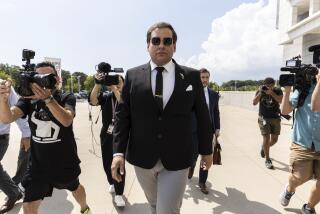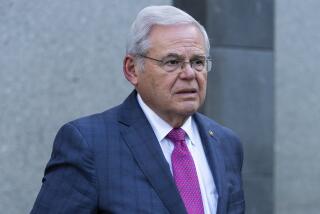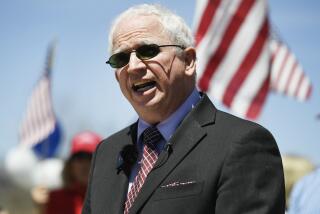Montoya’s Defense Dealt Blow as Key Aide Won’t Testify
- Share via
SACRAMENTO — Sen. Joseph B. Montoya’s defense against corruption charges, already stymied on several fronts, suffered another setback Wednesday when a key aide to the Whittier Democrat refused to testify.
Steven English, a consultant to the Senate Business and Professions Committee chaired by Montoya, said through his attorney that he would not take the witness stand, claiming his Fifth Amendment right against self-incrimination.
English’s refusal to testify on behalf of his boss finished out a day in which Montoya’s attorneys were able to do little to shake the prosecution’s case. In fact, the defense presented so few witnesses that U.S. District Judge Milton Schwartz sent the jury home after hearing less than two hours of testimony.
Montoya is on trial in federal court on 12 counts of extortion, racketeering, bribery and money laundering. Schwartz, in response to a detailed defense motion to dismiss the charges, said he will consider whether to dismiss the two bribery charges, which are based on a relatively new and complex statute. However, he ruled that the 10 remaining counts against Montoya will stand.
Defense attorney Michael Sands told the judge that English’s testimony was crucial in refuting one charge that Montoya sought payment from lobbyists who were representing foreign medical schools.
Karen Frick, a former Montoya aide, has testified that the senator told her and English that sponsorship of a bill for the medical schools would cost the lobbyists $5,000. At a subsequent meeting, she testi fied, English relayed the request for money to two lobbyists representing the schools.
English previously testified before the grand jury under a limited grant of immunity from prosecution. But U.S. Atty. David Levi refused to extend the immunity so English could testify at the trial.
Prosecutors argued that his testimony would do little to contradict Frick’s account of events, since he had told the grand jury that he could not recall many of the details of his meetings with Montoya or the lobbyists.
Ultimately, Schwartz sided with prosecutors, ruling that English’s refusal to testify did not warrant dismissing the extortion charge involving the medical schools.
Outside the courtroom, Sands said the judge’s ruling on English was an error that could provide grounds for appeal. “I certainly would have been hopeful we would have had better results from our rulings,” Sands ruefully told reporters.
Earlier in the day, Sen. Leroy Greene (D-Carmichael)--called as a defense witness--told the jury he had carried a bill on the Senate floor that had been planted by FBI agents in 1986.
But he said he received no payment for handling the bill. And Greene said he had no knowledge of any specific dealings Montoya may have had with federal undercover agents who gave Montoya $3,000.
Afterward, Greene told reporters he felt awkward testifying at Montoya’s trial, particularly since he believed undercover agents had attempted to snare him in 1986.
“There but for the grace of God go I,” Greene said. “I felt there were efforts made to entrap me. The people (undercover operatives) approached the members of my staff and they were rejected by members of my staff.”
More to Read
Get the L.A. Times Politics newsletter
Deeply reported insights into legislation, politics and policy from Sacramento, Washington and beyond. In your inbox twice per week.
You may occasionally receive promotional content from the Los Angeles Times.








